- Home
- Anne Mather
Follow Thy Desire Page 12
Follow Thy Desire Read online
Page 12
She shifted uncomfortably. Although she couldn’t comprehend what was being said, she didn’t like to be an unwilling eavesdropper, and she had risen to her feet when Morgan himself appeared in the doorway. His shirt sleeves were rolled back above his elbows, and around his arms and across his chest, the shirt clung to him in folds of dampness. His light hair, too, was artificially darkened by sweat, and tension had carved lines of weariness beside his nose and mouth.
‘I’m sorry,’ he said, switching to English automatically when he saw her. ‘I’m afraid I shan’t be joining you for lunch after all. But Kori will serve you, and I’ll speak to Andrea and insist that she eats in here.’
Helen licked her dry lips. ‘Oh, but—’ She gestured towards his sweat-stained shirt. ‘I can wait while you change—’
‘I’m not about to change,’ he interrupted her shortly. ‘I’m taking the child and its mother down to the hospital in Charlottesville. I’ll be back as soon as possible.’
He would have turned away then, but Helen’s jerky words of protestation stopped him. ‘But you can’t!’ she exclaimed. ‘I mean—you—couldn’t you get someone else to drive them down?’
‘Who do you suggest?’ he enquired coldly. ‘Kori? I think not.’
‘But you look so—so tired.’ She coloured. ‘I mean, you did have a headache this morning, didn’t you?’
His nostrils flared for a moment, and then he nodded with a faint softening of his expression. ‘All right,’ he agreed shortly. ‘I know you mean well. But right now I’m not in the mood to discuss my own shortcomings. Like I say, have lunch, take a rest. I should be back around eight o’clock.’
‘Eight o’clock!’ Helen’s nails dug into her palms. ‘I see.’
Morgan turned away, but again she stopped him:
‘It—it’s serious, then? The baby’s illness, I mean.’
‘You could say that,’ he muttered harshly. Then he gave her a wry look. ‘Don’t ask—that’s my advice to you. Just don’t ask. And he strode away out of sight.’
It was easier said than done. Helen walked to the door of the dining room, but Morgan had already gone and a few minutes later she heard the sound of the station wagon’s engine being started. It drew her to the windows, and she watched as Morgan reversed expertly on to the road, and drove away towards the village.
When the dust of his passing had settled, Helen turned back to find Kori just carrying a tray into the room. Expecting a hangdog expression, at least, she was surprised to find he looked as cheerful and unconcerned as ever, and his gesture towards the food invited appraisal.
Shaking away the feeling of unreality which had suddenly gripped her, Helen moved to the table and duly admired the succulent-looking steaks and the salad nestling on its bed of crushed ice.
‘It looks very nice,’ she said, because it was obviously expected of her, and wondered if it would taste as good as it looked.
‘Please to sit down,’ he insisted, drawing out a chair, and obediently she took her seat. ‘Now, you would like me to serve you?’
‘No, no, that’s all right. I can serve myself.’ Helen didn’t need his obsequious presence. ‘Er—perhaps you’d tell Miss—Miss Andrea—that lunch is ready.’
‘She knows,’ declared Kori blandly. ‘Massa sir, he told her, before he left for Charlottesville.’
His complacency infuriated her, and it was all she could do to prevent herself from ordering him out of the room. But instead she said, with what she hoped was cutting coolness: ‘Doesn’t that bother you at all? That your—employer has had to drive all the way back to Charlottesville half an hour after his arrival?’
Kori’s dark eyes were wide and innocent. ‘It nothing to do with Kori,’ he denied. ‘If stupid woman believe in tribal doctor’s medicine, it nothing to do with Kori.’
Helen looked down at her plate. Let it go, her conscience was appealing. Say no more. It’s nothing to do with you! But like Pandora she was unable to deny her curiosity.
‘What—what was wrong with the baby?’ she asked, lifting the serving fork in hands that were not quite steady, and sensed that Kori was speculating how much he ought to tell her.
‘Baby sick,’ he announced at last. ‘Baby have pain—here.’ He patted his own flat stomach.
‘I see.’ Helen rested the fork on her plate. ‘Then let’s hope the doctors at the hospital will be able to help.’
‘Mmm.’ Kori didn’t sound too concerned. ‘Boy weak,’ he decided at last, and then shrugged, as if dismissing it from his mind. ‘You like sauce? Mustard?’
‘No.’
Helen felt impatient with him and impatient with herself for trying to probe. It didn’t help when Andrea chose that moment to appear in the doorway, a bloodstained cloth in her hands.
‘I’ve washed the floor of the surgery with disinfectant, Kori,’ she told him. ‘Will you dispose of this for me?’
‘Sure thing, Miss Andrea.’
Kori took the cloth from her and Andrea ran her palms down the skirt of her dress. Helen’s appetite rapidly disappeared. The blood oozing from the steak was too reminiscent of what she had just witnessed, and she guessed, in spite of her efficiency, that Andrea had enjoyed shocking her like that.
Now the girl took her seat at the table and helped herself to a thick steak. She spooned salad on top of the hot meat and then shook mayonnaise on top. Helen looked at the steak on her own plate, and then reached for the jug of water. Kori had thoughtfully placed a muslin cloth over it, but the added warmth had melted the ice and it was unpleasantly warm. But at least it was easy to swallow, and dispersed the discomforting dryness in her throat. Helen knew Andrea was waiting for her to ask what the bloodstained cloth meant, but she held her tongue, and presently she managed to swallow a little of the tossed salad.
Kori brought in a bowl of fruit when he thought she had had time to finish her meal and looked with alarm at the untouched steak.
‘Is not good?’ he asked in surprise, but Helen shook her head.
‘I wasn’t hungry,’ she managed to explain, and with a shrug he took the plate away.
Andrea had eaten a good meal, Helen saw. Obviously the less palatable aspects of her father’s profession did not worry her, but Helen felt her callousness had been deliberately assumed. She doubted Andrea sat down to lunch every day without first washing her hands, and she guessed that if her father had been there it would have been a much different story.
Thinking of her father inevitably brought her own anxieties about him to the fore. She was concerned about the baby, of course, particularly as it seemed that the upset stomach was far from a simple one. But somehow she sensed that Morgan ought not to drive himself as hard as he did, and it was impossible to be wholly objective about it.
The coffee Kori served at the end of the meal was revitalising. In fact, the whole meal had been unexpectedly good and Helen wondered whether the boy’s efficiency made up for the less acceptable aspects of his character. Whatever, he certainly knew how to cook and serve a meal, and judging from the appearance of the villa, he was also extremely good at housekeeping.
Andrea seemed disappointed that her ruse to arouse Helen’s curiosity had not succeeded, and declining Helen’s offer of coffee, rose to leave the room. That was when Helen’s impatience overspilled.
‘Where are you going?’ she demanded, looking up at the girl. ‘Don’t you think your father would expect you to entertain your guest in his absence?’
It was not perhaps the best method of gaining Andrea’s attention, but the idea of spending the next few hours alone was even less appealing than suffering Andrea’s unwilling company.
The girl didn’t immediately say anything, however. She hung her head and looked uncomfortable, but at least she didn’t rush away. Gathering confidence, Helen added:
‘I’m sorry if you considered my remarks earlier were in bad taste, but they were spoken in good faith, and I had no intention of upsetting you.’
The silence stretched, an
d clearing her throat, Helen went on: ‘Your father thinks you spend too much time alone, do you know that? He thought perhaps you might welcome another female about the place, someone you could talk to. Oh, I know you don’t know me yet, and naturally you’re a little suspicious, but honestly, I just want us to be friends. And if you disappear every time I try to talk to you, it’s going to be hopeless!’
She paused again and this time caught the fleeting glance Andrea threw in her direction. Their eyes met and held, and then the younger girl lifted her head, almost defensively.
‘Why did you come here, Miss Raynor?’ she asked, much to Helen’s surprise. ‘Did my father ask you to come?’
Helen wished she could have been forewarned of the question. It had such a double edge. On the one hand was the obvious danger of suggesting a relationship that, so far as Morgan was concerned anyway, simply did not exist, and on the other the pitfalls implicit in admitting she had begged to come. And she could hardly blurt out the truth, that Andrea’s father was planning to send her back to England, with or without his involvement.
Groping desperately for a middle course, she said: ‘You know the situation in England. Well, it seemed a good idea for me to get away for a while. Your father—was kind enough to offer me the—the hospitality of his home.’
‘In return for what?’
Helen’s lips parted. What a suspicious little mind Andrea had, she thought uneasily. Why did she think her father had brought another woman to Hawk’s Drift? Did she imagine Helen to be his mistress? Had she hopes perhaps that one day her parents would be reunited and saw Helen’s presence as a threat? Did that account for the tangible hostility?
Now, remembering the old adage about attacking being the best method of defence, she asked: ‘Why do you think your father brought me here?’
For a moment, Andrea was silent. Then, hot colour burning in her pale cheeks, she said: ‘He won’t marry you, you know. He told me. He promised he would never marry anyone else!’
Helen felt as if someone had just punched her hard, in the area immediately below her ribcage. It wasn’t that the girl’s words were so unexpected. It was hearing them from her. Knowing that they had discussed her.
‘I couldn’t anyway, could I?’ she managed to point out at last. ‘I—your mother’s still alive.’
‘My mother!’ Andrea said the words with cold bitterness. ‘Oh, yes, she’s still alive. But what does that matter? They’re divorced!’
Divorced!
Helen tried not to look as astounded as she felt. Morgan was divorced! And he had never told her!
And yet, she argued, why should he? A man could be so sickened with one marriage that he would swear never to marry again. Obviously that was what Morgan had done, and what was more, meeting her had made no difference to his feelings.
That hurt, almost as much as Andrea’s denunciation. Almost as much as knowing that whatever Morgan felt for her, he did not consider it important.
It was difficult to be calm and collected after that, but somehow she succeeded, saying quietly: ‘Even so—we could be friends,’ although even as she said the words she knew that the last thing she wanted right now was to make friends with Morgan’s daughter.
Andrea considered this. Watching the play of emotions across her thin young face, Helen felt her compassion stirring. After all, she argued with herself, the girl was obviously insecure. It was natural that she should resent a stranger coming into her home to shred what little security she had.
Finally she said: ‘I’m not a very interesting person. Why should you want to be friends with me?’
It was a cruel self-indictment for one so young, and Helen felt a ridiculous impulse to take her in her arms and reassure her like the child she was. But Andrea would not have welcomed such a display, and besides, Helen didn’t know her well enough to be sure she was not playing some sophisticated game with her. She didn’t think she was, but only time would tell.
‘You underestimate yourself, Andrea,’ she said now. ‘I don’t think you believe that about yourself, any more than I do. What you need is someone to talk to, that’s all. Someone to discuss things with.’
‘What sort of things?’
Andrea was still suspicious, and Helen sighed as she rose to her feet. ‘Clothes,’ she offered carefully. ‘Hair styles, music, make-up.’
‘Make-up?’ echoed Andrea in surprise, and Helen knew she had scored one point at least.
‘Why not?’ she asked. ‘You’ll be fifteen soon, won’t you? It’s time you started to take an interest in your appearance.’
‘My birthday’s in two weeks,’ admitted Andrea, without enthusiasm. ‘But what can I do about my appearance? I’m too tall and too thin—and I wear glasses!’
Helen’s fingers stroked tentatively along the seams of her pants. At last, she thought with satisfaction. At last she was beginning to make some progress. It wouldn’t be easy. It was never easy to persuade someone that they could compete on equal terms with everyone else, particularly if they had got it into their heads that they couldn’t.
She remembered a case they had had at the clinic. A girl, not much older than Andrea, injured in a car accident, and convinced she would never walk again. She had lost all interest in herself, convinced herself that no boy would ever look at a cripple. Her plight had aroused everyone’s sympathy. Yet, with time and persuasion, she had been taught to use her legs again, and although she would never be able to run or play games, they had given her back mobility—and self-respect.
But Helen’s moment of self-congratulation was short-lived. Andrea’s face had crumpled as she waited for the other girl to reply, and in muffled tones she gasped: ‘Is that why he’s brought you here? To make me take an interest in myself? Is he so ashamed of me?’ And while Helen strove to find the words to deny the accusation, she added dramatically: ‘I wish I was dead!’ before running in distress from the room.
CHAPTER EIGHT
THE station wagon pulled on to the drive leading to the villa at about a quarter to nine. Helen, who had been sitting in the living room for over an hour waiting for Morgan’s return, felt her nerves stretch automatically. Her first impulse was to get to her feet, rush out into the hall to meet him, and blurt out the mess she had made of her first real exchange with Andrea; but the anxiety she had suffered waiting for his return was now uppermost in her mind, and she was afraid her relief at seeing him would undo the stringent controls she had determined to put on her emotions.
So she remained where she was, sitting in the lamplit room, counting again the squares of the tiles that stretched from her chair to the door. She already knew there were sixteen, she had already counted them a dozen times; but somehow she had to remain calm and composed.
It wasn’t easy. She had just spent one of the most awful days of her life, and what she needed most was sympathy—sympathy for herself, and escape from the traumatic turmoil of her thoughts. She needed someone to pour her troubles out to, not least someone to reassure her that she had not been responsible for lacerating Andrea’s self-confidence.
She had not laid eyes on the girl since that disastrous interchange after lunch, and again, while her instincts had been to go after her and try to reassure her, she had been afraid she might do more harm than good. Instead, she had spent the time flaying herself for her own crass clumsiness.
Kori had produced a meal around seven—a highly-spiced curry, the smell of which almost sickened her. But the hollow feeling inside her was not all nerves, and she had known that starving herself would only add to her physical discomfort. Forcing herself to swallow a few mouthfuls of the strongly-flavoured meat had not been easy, but she had managed it, and the small exchange with Kori over the collapsed soufflé that followed helped to delay the feeling of isolation that the onset of night was inevitably arousing.
That had been over an hour ago now, however, and the walls of the villa had begun to close around her, a sensation that was heightened by the repeated attacks of insects
against the window panes and a weird howling sound which she couldn’t identify. She had speculated on its being a lion or an elephant, but had decided it was more likely a hyena, which chilled her blood when she considered Morgan’s plight should the station wagon break down miles from home. But, one way or another, he had returned, and hearing footsteps in the hall outside, Helen wondered if Andrea had chosen to go and greet her father.
With sharpened senses, however, she heard only masculine voices beyond the door, Kori’s shrill and anxious, and Morgan’s deep and inexpressibly weary. Unable to sit still any longer, she crossed the space between her chair and the door and swung it open.
The two men turned at her appearance. Morgan was leaning heavily on Kori’s shoulder, she saw with dismay, his face white and strained, and it was obvious they were on their way to Morgan’s room further along the corridor.
‘What’s happened?’ The words spilled from her, and with an obvious effort Morgan pulled himself upright.
‘Nothing’s happened,’ he stated flatly. ‘My headache’s returned, that’s all. Driving back here almost blinded me, but don’t worry, I’ll be all right in the morning.’
Helen took a step towards them, her eyes darting to Kori and then back to Morgan again. ‘Let me help you,’ she said impulsively. ‘There must be something I can do.’ She paused. ‘Have you had anything to eat? Would you like something? Maybe a drink?’
‘I’m not hungry,’ he retorted, swaying slightly, but Kori took up Helen’s suggestion.
‘Some soup,’ he offered, his white teeth brilliant in his dark face. ‘A cup of tea. You like Kori should make you some tea?’
‘No—’
‘Yes, Kori.’ Helen’s acceptance overruled him. ‘I think Mr Fox would appreciate some tea,’ she declared firmly. ‘You go and make it. I’ll escort your employer to his room.’
‘You will not!’ Morgan snapped the words. ‘I tell you I—’
‘Go along, Kori.’ Using what little authority she had learned during her years at the hospital, Helen dismissed the boy, and with an admiring grin he went.

 A Forbidden Temptation
A Forbidden Temptation Dark Castle
Dark Castle Hell Or High Water
Hell Or High Water Jake Howard's Wife
Jake Howard's Wife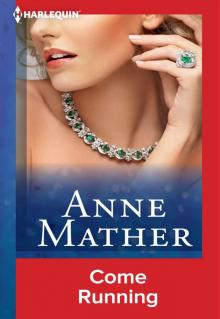 Come Running
Come Running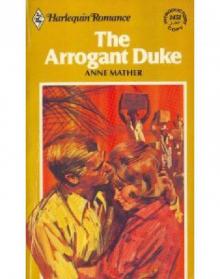 The Arrogant Duke
The Arrogant Duke Sweet Revenge
Sweet Revenge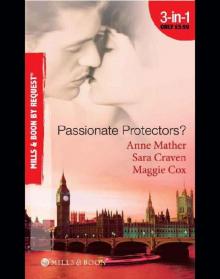 Passionate Protectors?
Passionate Protectors? Savage Awakening
Savage Awakening Come the Vintage
Come the Vintage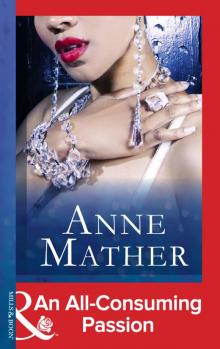 An All-Consuming Passion
An All-Consuming Passion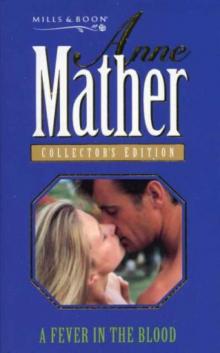 A Fever In The Blood
A Fever In The Blood The Shrouded Web
The Shrouded Web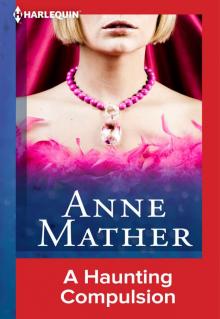 A Haunting Compulsion
A Haunting Compulsion Duelling Fire
Duelling Fire Edge of Temptation
Edge of Temptation Wild Enchantress
Wild Enchantress The Brazilian Millionaire's Love-Child
The Brazilian Millionaire's Love-Child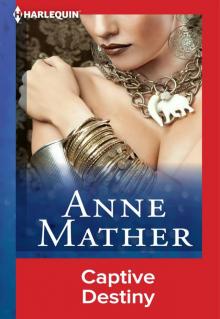 Captive Destiny
Captive Destiny The Pregnancy Affair
The Pregnancy Affair The Sanchez Tradition
The Sanchez Tradition A Passionate Affair
A Passionate Affair Sinful Truths
Sinful Truths Stay Through the Night
Stay Through the Night Seen by Candlelight
Seen by Candlelight No Gentle Possession
No Gentle Possession His Forbidden Passion
His Forbidden Passion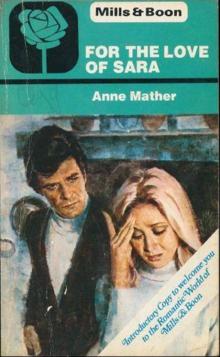 For the Love of Sara
For the Love of Sara A Trial Marriage
A Trial Marriage Melting Fire
Melting Fire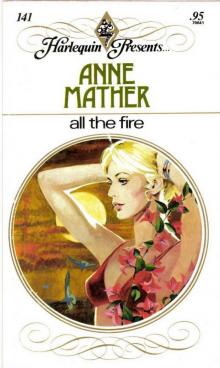 All The Fire
All The Fire Bedded For the Italian's Pleasure
Bedded For the Italian's Pleasure All Night Long
All Night Long The Japanese Screen
The Japanese Screen Rich as Sin
Rich as Sin Smokescreen
Smokescreen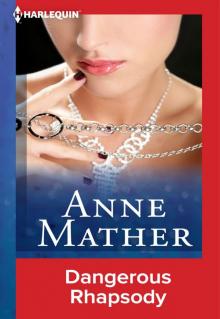 Dangerous Rhapsody
Dangerous Rhapsody Brittle Bondage
Brittle Bondage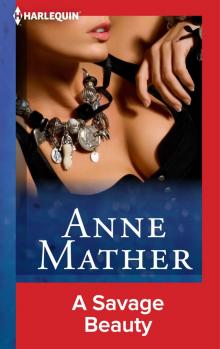 A Savage Beauty
A Savage Beauty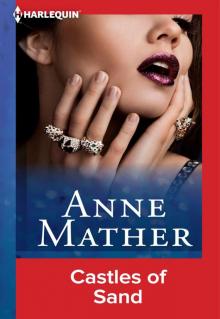 Castles of Sand
Castles of Sand A Distant Sound of Thunder
A Distant Sound of Thunder THE VIRGIN'S SEDUCTION
THE VIRGIN'S SEDUCTION White Rose of Winter
White Rose of Winter Proud Harvest
Proud Harvest The Legend of Lexandros
The Legend of Lexandros Country of the Falcon
Country of the Falcon Diamond Fire
Diamond Fire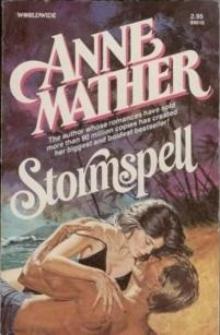 Stormspell
Stormspell Legacy of the Past
Legacy of the Past Such Sweet Poison/Blind Passion
Such Sweet Poison/Blind Passion The Baby Gambit
The Baby Gambit The Smouldering Flame
The Smouldering Flame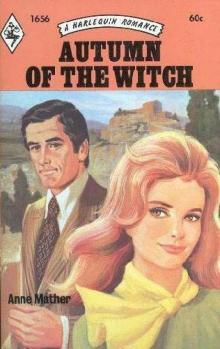 Autumn of the Witch
Autumn of the Witch Rachel Trevellyan
Rachel Trevellyan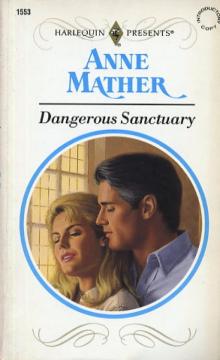 Dangerous Sanctuary
Dangerous Sanctuary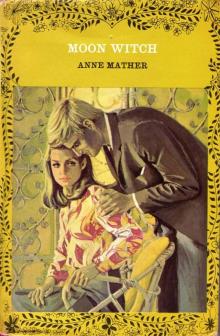 Moon Witch
Moon Witch An Heir Made in the Marriage Bed
An Heir Made in the Marriage Bed Images Of Love
Images Of Love Innocent Obsession
Innocent Obsession Tidewater Seduction
Tidewater Seduction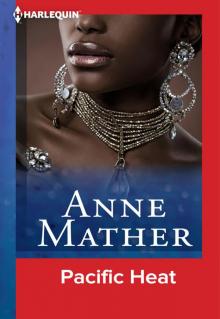 Pacific Heat
Pacific Heat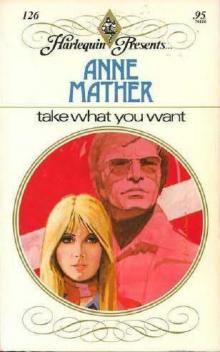 Take What You Want
Take What You Want The Spaniard's Seduction
The Spaniard's Seduction The High Valley
The High Valley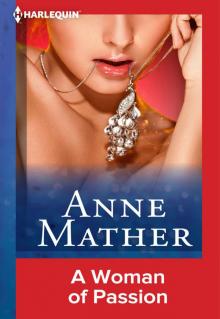 A Woman of Passion
A Woman of Passion The Reluctant Governess
The Reluctant Governess Charade in Winter
Charade in Winter Mendez’s Mistress
Mendez’s Mistress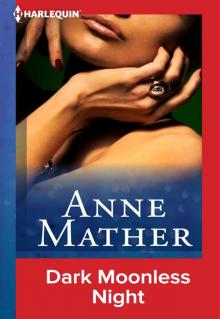 Dark Moonless Night
Dark Moonless Night The Greek Tycoon's Pregnant Wife
The Greek Tycoon's Pregnant Wife The Autumn of the Witch
The Autumn of the Witch Night Heat
Night Heat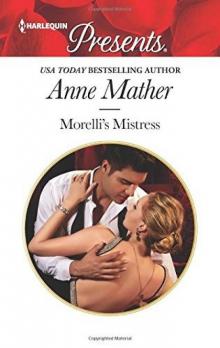 Morelli's Mistress (Harlequin Presents)
Morelli's Mistress (Harlequin Presents) Jack Riordan's Baby
Jack Riordan's Baby Beware the Beast
Beware the Beast Born Out of Love
Born Out of Love Greek Affairs in his Bed: Sleeping with a StrangerBlackmailed into the Greek Tycoon’s BedBedded by the Greek Billionaire
Greek Affairs in his Bed: Sleeping with a StrangerBlackmailed into the Greek Tycoon’s BedBedded by the Greek Billionaire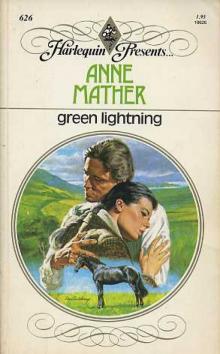 Green Lightning
Green Lightning Guilty
Guilty Snowfire
Snowfire Moondrift
Moondrift Stolen Summer
Stolen Summer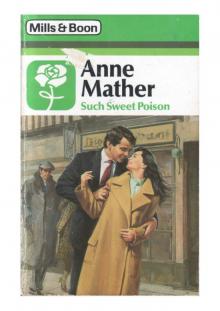 Such Sweet Poison
Such Sweet Poison Dark Venetian
Dark Venetian Innocent Sins
Innocent Sins Baby Out of the Blue
Baby Out of the Blue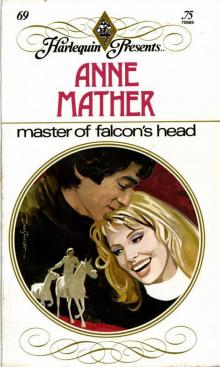 Master of Falcon's Head
Master of Falcon's Head Rooted in Dishonour
Rooted in Dishonour A Secret Rebellion
A Secret Rebellion The Forbidden Mistress
The Forbidden Mistress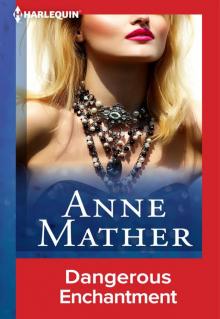 Dangerous Enchantment
Dangerous Enchantment The Judas Trap
The Judas Trap Burning Inheritance
Burning Inheritance Forbidden Flame
Forbidden Flame Who Rides the Tiger
Who Rides the Tiger Impetuous Masquerade
Impetuous Masquerade Fallen Angel
Fallen Angel Act of Possession
Act of Possession Dangerous Temptation
Dangerous Temptation Pale Dawn Dark Sunset
Pale Dawn Dark Sunset Dark Enemy
Dark Enemy Innocent Virgin, Wild Surrender
Innocent Virgin, Wild Surrender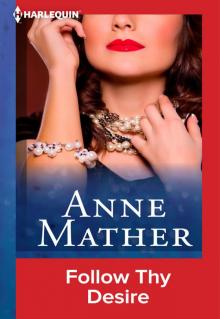 Follow Thy Desire
Follow Thy Desire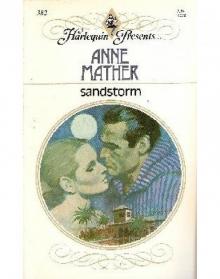 Sandstorm
Sandstorm Apollo's Seed
Apollo's Seed Whisper Of Darkness
Whisper Of Darkness A Wild Surrender
A Wild Surrender A Dangerous Taste of Passion
A Dangerous Taste of Passion The Night Of The Bulls
The Night Of The Bulls Hot Pursuit
Hot Pursuit The Longest Pleasure
The Longest Pleasure An Elusive Desire
An Elusive Desire Storm In A Rain Barrel
Storm In A Rain Barrel